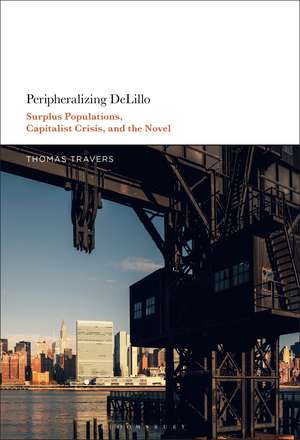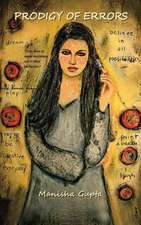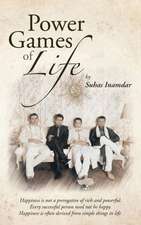Peripheralizing DeLillo: Surplus Populations, Capitalist Crisis, and the Novel
Autor Dr. Thomas Traversen Limba Engleză Paperback – 26 iul 2023
| Toate formatele și edițiile | Preț | Express |
|---|---|---|
| Paperback (1) | 191.04 lei 6-8 săpt. | |
| Bloomsbury Publishing – 26 iul 2023 | 191.04 lei 6-8 săpt. | |
| Hardback (1) | 510.10 lei 6-8 săpt. | |
| Bloomsbury Publishing – 12 ian 2022 | 510.10 lei 6-8 săpt. |
Preț: 191.04 lei
Preț vechi: 249.20 lei
-23% Nou
Puncte Express: 287
Preț estimativ în valută:
36.56€ • 37.88$ • 30.51£
36.56€ • 37.88$ • 30.51£
Carte tipărită la comandă
Livrare economică 22 martie-05 aprilie
Preluare comenzi: 021 569.72.76
Specificații
ISBN-13: 9781501378393
ISBN-10: 1501378392
Pagini: 240
Dimensiuni: 152 x 229 x 25 mm
Greutate: 0.32 kg
Editura: Bloomsbury Publishing
Colecția Bloomsbury Academic
Locul publicării:New York, United States
ISBN-10: 1501378392
Pagini: 240
Dimensiuni: 152 x 229 x 25 mm
Greutate: 0.32 kg
Editura: Bloomsbury Publishing
Colecția Bloomsbury Academic
Locul publicării:New York, United States
Caracteristici
Develops a reading of DeLillo that goes beyond the discourse of postmodernism and links his fiction to ideas of uneven development
Notă biografică
Thomas Travers is an independent scholar based in the UK. He holds a doctorate in English Literature from Birkbeck, University of London, UK.
Cuprins
Introduction: 'Breathing the Fumes of Free Enterprise Forever: Don DeLillo and Marxism1. 'Anticipating Martian Archaeologists'; Or, On the Contemporaneity of the Early Short Stories 2. 'The Uncounted': Romance, Realism, and Uneven Development in the Political Thrillers 3. Dialectics Derailed: Catastrophe and the Historical Novel4. 'Enfolded in the Will of Capital': Twenty-First Century DeLillo Conclusion: How to Survive a Dead Idea BibliographyIndex
Recenzii
Providing us with a startling new reading of Don DeLillo's oeuvre, from his very earliest short stories to his late minimalism, Thomas Travers' book is, however, far more than simply a great study of one of the most important U.S. novelists of our time. It is also one of the most significant books on Marxist literary theory and on the contemporary novel's responses to economic crisis, financialization and the dynamics of dispossession that has been published this century. A major advance in our understanding of the novel's attempts to grapple with the challenges to representation posed by contemporary capitalism.
Answering some big questions about the postmodern hypothesis from the ground zero of its ruin, this book sets out to reinvent DeLillo as a novelist of the anonymously dispossessed masses whose multitude defines our historical present. The DeLillo that emerges from these pages is less the exemplar of postmodernism in fiction than he is a prophet of dissent, a prescient thinker and artist whose writings conjoin the dominant characterological tendency of literary fiction since the 1960s with the social antagonism we are now seeing on the streets, writing its own epic in the language of rage and fire.
DeLillo is not the archetypal postmodern novelist we believed him to be, but an epic poet of the dispossessed, cartographer of the surplus populations thrown off by the 'long downturn', his fictions striving to re-historicize capitalism's cast-offs as emergent subjects of History: such is Travers's original and compelling thesis. The book effects a wholesale reconceptualization of the Jamesonian problematic of postmodernism, rewriting the relation of politics and form for the era of secular stagnation via Deleuze and Guattari's untapped notion of peripheralization: it is a critical triumph and a superlative work of Marxist literary theory.
Answering some big questions about the postmodern hypothesis from the ground zero of its ruin, this book sets out to reinvent DeLillo as a novelist of the anonymously dispossessed masses whose multitude defines our historical present. The DeLillo that emerges from these pages is less the exemplar of postmodernism in fiction than he is a prophet of dissent, a prescient thinker and artist whose writings conjoin the dominant characterological tendency of literary fiction since the 1960s with the social antagonism we are now seeing on the streets, writing its own epic in the language of rage and fire.
DeLillo is not the archetypal postmodern novelist we believed him to be, but an epic poet of the dispossessed, cartographer of the surplus populations thrown off by the 'long downturn', his fictions striving to re-historicize capitalism's cast-offs as emergent subjects of History: such is Travers's original and compelling thesis. The book effects a wholesale reconceptualization of the Jamesonian problematic of postmodernism, rewriting the relation of politics and form for the era of secular stagnation via Deleuze and Guattari's untapped notion of peripheralization: it is a critical triumph and a superlative work of Marxist literary theory.




















